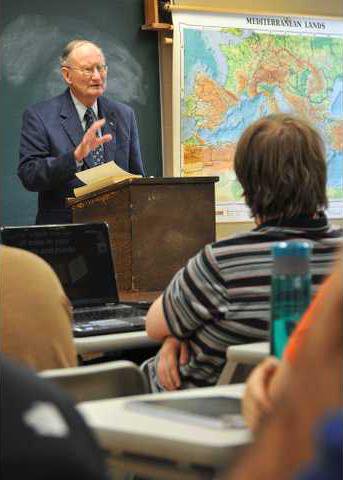OAKWOOD - The American troops met fierce German resistance the first morning they invaded the heavily fortified city of Metz, France.
They climbed a hill, only to be met by enemy fire from concrete "pillboxes," or protective bunkers, that "would come out of the ground," said World War II veteran and Silver Star recipient
Harold George.
"It took about three weeks or more to conquer Metz with a whole army involved," he said. "I had two friends who were with me through basic training ... and within a week, both of those boys were dead.
"I'm lucky to be here."
George described his war experiences Tuesday afternoon to two groups of Gainesville State College students.
A longtime resident of Florida after the war, he now lives in South Georgia and has a summer place in western North Carolina.
He was visiting with Parker Young, father of Douglas Young, a political science professor at Gainesville State.
"He did more than his fair share in liberating Europe," Young said.
Young referred to the Silver Star, the third-highest military decoration that can be awarded to a member of any branch of U.S. armed forces for valor in battle.
The 85-year-old veteran, who showed the medal to the students, said he entered the Army from Florida Southern College in Lakeland, Fla., taking basic training at Fort Benning near Columbus.
He went to North Carolina State University in the spring of 1944 to study becoming an Army engineer.
George said he was pulled from school in the fall and sent to Europe as one of 120,000 "replacement infantry troops."
"The cost of war is unbelievable," he said.
George ended up serving under Gen. George Patton as part of the Third Army, starting at Metz.
"I joined the 95th Infantry Division in the middle of the night," he said. "The next morning was kick-off time."
After Metz, Americans pressed through Germany's main line of defense.
"We were there about a couple of weeks, just holding our own," George said. "At that time, the breakthrough of the Battle of the Bulge had occurred and a lot of the Third Army that wasn't tied down, like we were, went up finally and relieved (troops in) Bastogne (in Belgium)."
On Jan. 29, 1945, his 20th birthday, George and fellow troops went to Bastogne in "an open Army truck in the snow."
He later went to Holland serving under a British company, then joined up with the U.S. Ninth Army and crossed into Germany.
"We would ride on the backs of tanks until we would run into opposition, and then we'd have to get off and fight," George said.
At the end of the war, Americans stopped just inside the Ruhr area of Germany and captured "an awful lot of German soldiers," he added.
George returned to the U.S. at the end of June and took a 30-day leave. He later went to Camp Shelby in Jackson, Miss.
"Eight days later, the (atomic) bomb was dropped (on Japan)," he said, gently thumping his fist on the podium.
"Now, I don't know how you feel personally, but I praise the Lord for the atomic bomb, primarily because it saved untold lives."

